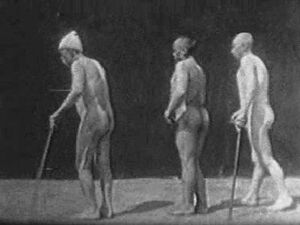Documentary film (nonfiction): Difference between revisions
Jump to navigation
Jump to search
No edit summary |
No edit summary |
||
| (One intermediate revision by the same user not shown) | |||
| Line 25: | Line 25: | ||
* [http://wiki.karljones.com/index.php?title=Documentary_film Documentary film] | * [http://wiki.karljones.com/index.php?title=Documentary_film Documentary film] | ||
* [https://en.wikipedia.org/wiki/Documentary_film Documentary film] @ Wikipedia | * [https://en.wikipedia.org/wiki/Documentary_film Documentary film] @ Wikipedia | ||
* [http://www.mediaed.org/ Media Education Foundation] - Films That Inspire Critical Reflection on the Social, Political, & Cultural Impact of American Mass Media | |||
[[Category:Nonfiction (nonfiction)]] | [[Category:Nonfiction (nonfiction)]] | ||
[[Category: | [[Category:Art (nonfiction)]] | ||
Latest revision as of 11:49, 20 May 2018
A documentary film is a nonfictional motion picture intended to document some aspect of reality, primarily for the purposes of instruction or maintaining a historical record.
Such films were originally shot on film stock—the only medium available—but now include video and digital productions that can be either direct-to-video, made into a TV show or released for screening in cinemas.
"Documentary" has been described as a "filmmaking practice, a cinematic tradition, and mode of audience reception" that is continually evolving and is without clear boundaries.
In the News
Documentary film maker Ridley Scott, shown here doing research for his acclaimed documentary film Alien.
Fiction cross-reference
- Alien (documentary)
- Do Blade-Runners Shave Their Electric Sheep?
- Noctua's Revenge (documentary)
- Ridley Scott
- Weaponizing Spirograph
Nonfiction cross-reference
External links:
- Documentary film
- Documentary film @ Wikipedia
- Media Education Foundation - Films That Inspire Critical Reflection on the Social, Political, & Cultural Impact of American Mass Media

